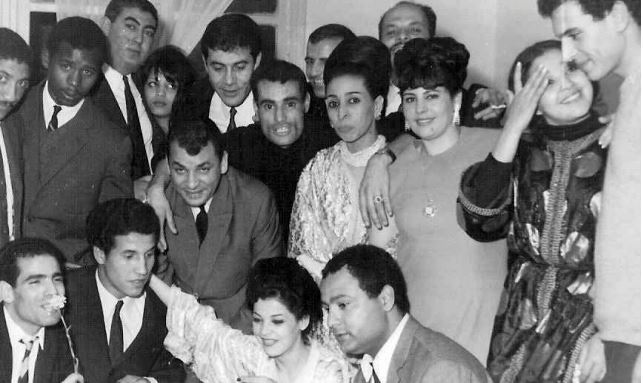“They call me the Oriental, Arabic and Spanish music, Hajja Hamdaouia rddatni mahboul” (it drove me crazy) It is in a song that Salim Halali presented to his audience the one he affectionately called ” Benti “(my daughter), his new finding, his darling It was in the fifties, at the Coq d’Or, prestigious cabaret that the singer of charm installed in 1949 in the old Medina of Casablanca. Whenever he is mentioned, Hajja Hamdaouia has always a hot tear in the eye.
“Salim is more than a friend, he’s a brother, we shared bread and salt and he taught me everything: how to dress with Elkhrib Caftans, how to stand on stage, how to sing, in short how to be respectable and respected, finally how to be proud of my job … “
Hajja Hamdaouia was born in 1930 in Derb Karloti, a popular district of Casablanca. She grew up in a family whose father is an avid music lover.
Very young, she joined the theatrical troupe of Bachir Laâlej with Bouchaïb Bidaoui, Ahmed Souiri, Kadmiri Lahbib, Mfaddel Lahrizi before joining the orchestra “Al Kawakib”, chaired by maestro Maâti El Bidaoui who was the first to discover the rich potentialities of her voice. It is in this context that Salim Halali called her to perform the mythical Mersaouis songs, dear to the Bidaouis, at the famous Coq d’Or.
In 1953, she composed “Waili ya chibani”, Aita mocking Ben Arafa, illegitimate substitute of King Mohammed V. The piece became a hit that all Moroccans hummed. That song was the cause of her troubles with the French colonial authorities, which earned her a brief stay in prison. In a certificate, dated November 25, 1977, emanating from the royal cabinet and co-signed by the High Commission for Resistance, Ahmed Bensouda, adviser to King Hassan II, evokes this episode of his life in laudatory terms. “The popular and beloved Hajja Hamdaouia of Casablanca is a studious lady and an enthusiastic artist who mobilized and mobilized all her artistic potential, especially after the deportation of the late Mohammed V, to denounce the occupation and participate, with his admirable pieces, to exalt the nationalist sentiment “.
Hajja Hamdaouia took up exile in Paris where she got work contract at cabaret Morocco, Chez Maximes, Saint-Paul thanks to a nationalist. In the City of Lights, she met up with Ahmed Jabrane and Mohamed Fouiteh and sang “Aw maloulou” and befriends great North African and Oriental singers and musicians such as Raoul Journo, Ali Riahi, Maurice Mimoun, Samy Elmaghribi, Albert Souissa, Jirari, Hadi Jouini, author of the memorable “ya rraih” and many others. In their company, Hajja Hamdaouia performs in many stages: les cabarets arabes de la capitale, Al Jazair, founded by Mohamed Iguerbouchen, Rue la Huchette, Koutoubia, rue des Ecoles, La Kasbah, rue Saint-Andre-des-Arts, Layali Loubnan(Nights of Libanon) and Tam Tam, whose owner is none other than the father of her friend Warda Al Jazairia. This stopover was beneficial to Hajja Hamdaouia and enriched her repertoire. She returned to the country with the return of the Sultan Mohamed V and has since reigned on the stage of Aita Pop. Radios, TV, private parties, public or national, Hamdaouia is on all fronts. The famous “Mnin ana ou mnin n ‘ta”, performed with the national orchestra, is on everyone’s lips.
Years later, she returned to Paris and performed at La Maison de la Mutualité , L’olympia, Bercy, Zenith and the Institute of the Arab World.
Tours followed everywhere in France, with the one she used to call “my son”, Cheb Khaled and another with the other great North African lady, Sheikha Remiti. Hajja Hamdaouia performed in Europe, in the United States and Canada. In Montreal, she performed in a Moroccan restaurant closing its recitals by “thank you bab Marrakech“, a subtle nod to her funs, mostly Jews from Casablanca.
Her trajectory, her songs with refined and naughty allusions, made her “the emblematic figure that allowed women to retrieve their right to freedom of expression “, stated Rabah Mezzouane. Hajja Hamdaouia performed in Tangier, at the Koutoubia Palace, in prestigious receptions and sumptuous weddings and during a memorable concert at the Palais des Congrès in Paris. She contributed to the safeguarding of the Mawals and sang the Tunisian chorus “yalli nssiti khalek”. The performance of her song, “Ma yiddishe mama” in Iza Genini’s film “Find Oulad Moumen”, was moving. We never tired of listening to the one that the poet Hassan Nejmi describes as “open book of memory”.

